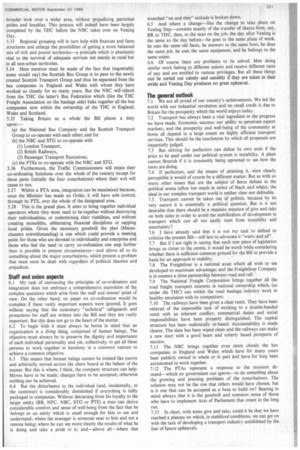The general outlook
Page 225

If you've noticed an error in this article please click here to report it so we can fix it.
7.1 We are all proud of our country's achievements. We led the world with our industrial revolution and no small credit is due to Britain for the prosperity which the world enjoys today.
7.2 Transport has always been a vital ingredient in the progress we have made. Economic success: our ability to penetrate export markets; and the prosperity and well-being of the community at home all depend to a large extent on highly efficient transport services. This should be the touchstone by which all proposals are impartially judged.
7.3 But striving for perfection can defeat its own ends if the price to be paid under our political system is instability. A plant cannot flourish if it is constantly being uprooted to see how the roots are doing.
7.4 If perfection, and the means of attaining it, Were clearly perceptible it would of course be a different matter. But as with so many other issues that are the subject of fierce debate in the political arena (often too much in terms of black and white), the ideal in our complex transport world is neither clear nor definable. 7.5 Transport cannot be taken out of politics, because -by its very nature it is essentially a political question. But is it not desirable that there should be a requisite measure of give and take on both sides in order to avoid the stultification of development in transport which can all too easily stem from instability and uncertainty?
7.6 1 have already said that it is not my task to defend or criticize the present Bill—still less to advocate it "warts and all". 7.7 QM if I ant right in saying that each new piece of legislation brings us closer to the centre, it would be worth While considering whether there is sufficient common ground for the Bill to provide a basis for an approach to stability.
7.8 The Freightliner is a national asset which all wish to see developed to maximum advantage; and the Freightliner Company is in essence a close partnership between road and rail.
7.9 The National Freight Corporation brings together all the road freight transport interests in national ownership which, (as under the THC) can within the road haulage industry work in healthy emulation with its competitors.
7.10 The railways have been given a clear remit. They have been relieved of the impossible task of working to a double-headed remit with an inherent conflict; commercial duties and social responsibilities have been properly distinguished. The capital structure has been realistically re-based. Accountability is made clearer. The slate has been wiped clean and the railways can make a new start with a good heart and soberly based prospects of success.
7.11 The NBC brings together even more closely the bus companies in England and Wales which have for many years been publicly owned in whole or in part and have for long been accustomed to work together.
7.12 The PTAs represent a response to the insistent demand—which no government can ignore—to do something about the growing and pressing problems of the conurbations. The solution may not be the one that others would have chosen, but is it one that can be accepted as a base to build on? Bearing in mind always that it is the goodwill and common sense of those who have to implement Acts of Parliament that count in the long run.
7.13 In short, withsome give and take, could it be that we have reached a plateau on which, in stabilized conditions, we can get on with the task of developing a transport industry uninhibited by the fear of future upheavals.


















































































































































































































































































































































































